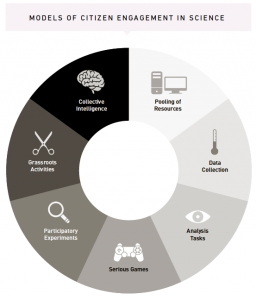Citizen Science refers to the general public engagement in genuine scientific research activities. Citizens actively contribute to science either with their intellectual effort or surrounding knowledge or with their tools and resources.
Scientists and citizens work together towards a common goal – a scientific question or a citizen driven intervention – both bringing in their expert knowledge. The combination of the “know-how” brought in by citizens with the “know-why” contributed by scientists, helps to support bottom- up initiatives, by e.g. providing evidence for interventions, supporting decision-making and promoting volunteers’ stewardship and awareness.
The European Citizen Science Association (ECSA) has defined 10 key principles for defining good practice in Citizen Science: 10 principles of Citizen Science
The White Paper on Citizen Science in Europe presents different ways of citizen engagement in science, stressing the importance of partnerships across the different actors. The document also presents current challenges of participatory science and suggests support on micro, meso and macro level. It is a good read!

Chart taken from the “White Paper on Citizen Science for Europe“
In CAPTOR the local communities, citizens, NGOs, and scientists are equal partners. Their objective is to raise awareness and find solutions to the air pollution problem, collecting high quality data on ozone pollution, stimulating mutual learning between the involved stakeholders and collaborative solution finding.
You want to know how to “Join CAPTOR“?

